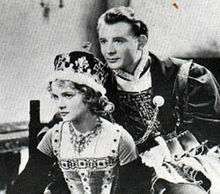Tudor Rose (film)
Tudor Rose (US title Nine Days a Queen) is a 1936 British film directed by Robert Stevenson and starring Cedric Hardwicke and Nova Pilbeam.
| Tudor Rose | |
|---|---|
 Nova Pilbeam and John Mills | |
| Directed by | Robert Stevenson |
| Produced by | Hubert Bath |
| Written by | Miles Malleson (dialogue) Robert Stevenson (screenplay) |
| Starring | Cedric Hardwicke Nova Pilbeam |
| Music by | Hubert Bath (composer) Louis Levy (music director & additional music) |
| Cinematography | Mutz Greenbaum |
| Edited by | Terence Fisher |
| Distributed by | Gaumont British |
Release date |
|
Running time | 78 min |
| Country | United Kingdom |
| Language | English |
The film is a dramatization of Lady Jane Grey's brief reign as the Queen of England. It opens with King Henry VIII on his deathbed stating the order of succession, and ends with Jane's beheading. It took some liberties with the history of the period, including a fictional Earl of Warwick playing a similar role to John Dudley, 1st Duke of Northumberland in real life (Dudley having held the title Earl of Warwick earlier in his career).
The title refers to the Tudor rose. The story of Lady Jane Grey was also the basis for the film Lady Jane (1986).
Cast
- Cedric Hardwicke as the Earl of Warwick
- Nova Pilbeam as Lady Jane Grey
- John Mills as Lord Guilford Dudley
- Felix Aylmer as Edward Seymour, 1st Duke of Somerset
- Leslie Perrins as Thomas Seymour
- Frank Cellier as King Henry VIII
- Desmond Tester as Edward VI
- Gwen Ffrangcon-Davies as Mary Tudor
- Martita Hunt as Lady Frances Brandon Grey, Lady Jane's mother
- Miles Malleson as Henry Grey, 1st Duke of Suffolk, Lady Jane's father
- Sybil Thorndike as Ellen
- John Laurie as John Knox
- Roy Emerton as Squire
- John Turnbull as Arundell
Reception
Writing for The Spectator in 1936, Graham Greene gave the film a negative review, noting that he had "seldom listened to more inchoate rubbish than in Tudor Rose". Withholding harsh criticism of the direction which he described as "smooth, competent, if rather banal", Greene lambasted the historicity of the characterizations of the figures depicted, the dialogue/writing, and the scenes. According to Greene, "[t]here is not a character, not an incident in which history has not been altered for the cheapest of reasons", and he concluded that historical drama had reached "the Dark Age of scholarship and civilization".[1]
The film was voted the second best British movie of 1936, after The Ghost Goes West, by readers of Film Weekly magazine. Nova Pilbeam won the magazine's Best Acting award, ahead of Robert Donat in the other film.[2]
References
- Greene, Graham (8 May 1936). "Anne-Marie/Tudor Rose". The Spectator. (reprinted in: Taylor, John Russell, ed. (1980). The Pleasure Dome. pp. 73–74. ISBN 0192812866.)
- "BEST FILM PERFORMANCE LAST YEAR". The Examiner. Launceston, Tasmania. 9 July 1937. p. 8 Edition: LATE NEWS EDITION and DAILY. Retrieved 4 March 2013 – via National Library of Australia.
External links
- Tudor Rose on IMDb